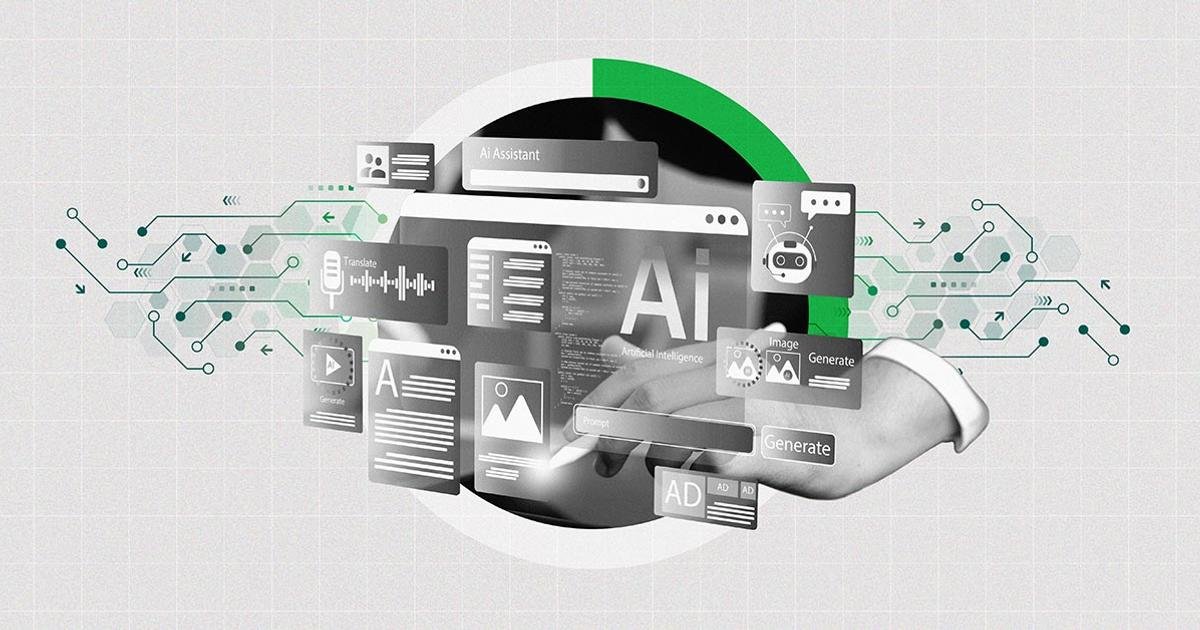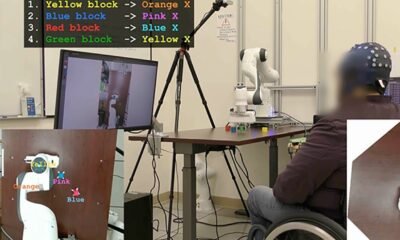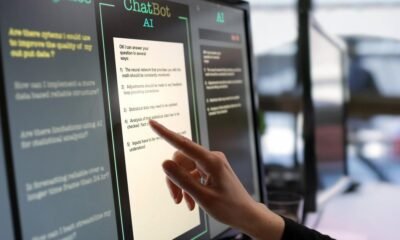AI Insights
Trump touts $92 billion in AI, energy in Pittsburgh

US inflation rose in June as Trump’s tariffs hiked prices
US inflation rose again in June to its highest level in four months, as President Donald Trump’s tariffs began driving up consumer prices.
unbranded – Newsworthy
President Trump has long expressed his desire to see America dominate the global market in artificial intelligence innovation. In fact, one of the first executive orders he signed was aimed at removing barriers to American leadership in the fast-growing field.
On July 15, Trump travelled to Pennsylvania to tout more than $92 billion in private sector investment in the state, including in data centers, energy, power infrastructure and personnel needed to fuel the country’s AI ambitions.
“This is a really triumphant day for the people of the Commonwealth and for the United States of America. We’re doing things that nobody ever thought possible,” said Trump as he spoke at the first Pennsylvania Energy and Innovation Summit held at Pittsburgh’s Carnegie Mellon University.
The event was organized by Sen. Dave McCormick, a Pennsylvania Republican, a former hedge fund CEO, who brought together industry titans from the finance and tech world who had made major commitments to the state.
It also happens to be a battleground state, which was crucial to Trump’s victory in 2024.
“We did very well in this state, as you know, three times actually,” said Trump, misstating the electoral outcomes during his three bids for the presidency. While he won the state in 2016 and 2024, Trump lost Pennsylvania to Joe Biden in 2020.
McCormick highlighted various companies that made commitments to the state. Blackstone, for instance, announced a $25 billion investment in data center and energy infrastructure development in northeastern Pennsylvania. The investment is expected to create 6,000 construction jobs along with 3,000 new permanent jobs, according to McCormick’s office.
First Energy will invest $15 billion to expand power distribution, strengthen grid infrastructure, and operate the enhanced grid, supporting 56 of the 67 Pennsylvania counties.
As the nation’s second-largest energy producer and a global nuclear power leader, Pennsylvania is uniquely positioned to deliver the abundant, affordable energy that growing AI and advanced manufacturing sectors demand, said McCormick.
He also credited Trump as a catalyst for the investments: “It is the manifestation of your agenda,” he said.
Trump was accompanied at the event by a large contingent of his cabinet and other government officials, including Commerce Secretary Howard Lutnick, Treasury Secretary Scott Bessent, Interior Secretary Doug Burgum and White House AI Czar David Sacks.
“I think we have a true golden age for America,” said Trump. “It truly is the hottest country anywhere in the world.”
Swapna Venugopal Ramaswamy is a White House correspondent for USA TODAY. You can follow her on X @SwapnaVenugopal
AI Insights
University of North Carolina hiring Chief Artificial Intelligence Officer

The University of North Carolina (UNC) System Office has announced it is hiring a Chief Artificial Intelligence Officer (CAIO) to provide strategic vision, executive leadership, and operational oversight for AI integration across the 17-campus system.
Reporting directly to the Chief Operating Officer, the CAIO will be responsible for identifying, planning, and implementing system-wide AI initiatives. The role is designed to enhance administrative efficiency, reduce operational costs, improve educational outcomes, and support institutional missions across the UNC system.
The position will also act as a convenor of campus-level AI leads, data officers, and academic innovators, with a brief to ensure coherent strategies, shared best practices, and scalable implementations. According to the job description, the role requires coordination and diplomacy across diverse institutions to embed consistent policies and approaches to AI.
The UNC System Office includes the offices of the President and other senior administrators of the multi-campus system. Nearly 250,000 students are enrolled across 16 universities and the NC School of Science and Mathematics.
System Office staff are tasked with executing the policies of the UNC Board of Governors and providing university-wide leadership in academic affairs, financial management, planning, student affairs, and government relations. The office also has oversight of affiliates including PBS North Carolina, the North Carolina Arboretum, the NC State Education Assistance Authority, and University of North Carolina Press.
The new CAIO will work under a hybrid arrangement, with at least three days per week onsite at the Dillon Building in downtown Raleigh.
UNC’s move to appoint a CAIO reflects a growing trend of U.S. universities formalizing AI integration strategies at the leadership level. Last month, Rice University launched a search for an Assistant Director for AI and Education, tasked with leading faculty-focused innovation pilots and embedding responsible AI into classroom practice.
The ETIH Innovation Awards 2026
AI Insights
Pre-law student survey unmasks fears of artificial intelligence taking over legal roles

“We’re no longer talking about AI just writing contracts or breaking down legalese. It is reshaping the fundamental structure of legal work. Our future lawyers are smart enough to see that coming. We want to provide them this data so they can start thinking about how to adapt their skills for a profession that will look very different by the time they enter it,” said Arush Chandna, Juris Education founder, in a statement.
Juris Education noted that law schools are already integrating legal tech, ethics, and prompt engineering into curricula. The American Bar Association’s 2024 AI and Legal Education Survey revealed that 55 percent of US law schools were teaching AI-specific classes and 83 percent enabled students to learn effective AI tool use through clinics.
Juris Education’s director of advising Victoria Inoyo pointed out that AI could not replicate human communication skills.
“While AI is reshaping the legal industry, the rise of AI is less about replacement and more about evolution. It won’t replace the empathy, judgment, and personal connection that law students and lawyers bring to complex issues,” she said. “Future law students should focus on building strong communication and interpersonal skills that set them apart in a tech-enhanced legal landscape. These are qualities AI cannot replace.”
Juris Education’s survey obtained responses from 220 pre-law students. The challenge of maintaining work-life balance was cited by 21.8 percent of respondents as their primary career concern; increasing student debt juxtaposed against low job security was the third most prevalent concern with 17.3 percent of respondents citing it as their biggest career fear.
AI Insights
Trust in Businesses’ Use of AI Improves Slightly

WASHINGTON, D.C. — About a third (31%) of Americans say they trust businesses a lot (3%) or some (28%) to use artificial intelligence responsibly. Americans’ trust in the responsible use of AI has improved since Gallup began measuring this topic in 2023, when just 21% of Americans said they trusted businesses on AI. Still, just under half (41%) say they do not trust businesses much when it comes to using AI responsibly, and 28% say they do not trust them at all.
###Embeddable###
These findings from the latest Bentley University-Gallup Business in Society survey are based on a web survey with 3,007 U.S. adults conducted from May 5-12, 2025, using the probability-based Gallup Panel.
Most Americans Neutral on Impact of AI
When asked about the net impact of AI — whether it does more harm than good — Americans are increasingly neutral about its impact, with 57% now saying it does equal amounts of harm and good. This figure is up from 50% when Gallup first asked this question in 2023. Meanwhile, 31% currently say they believe AI does more harm than good, down from 40% in 2023, while a steady 12% believe it does more good than harm.
###Embeddable###
The decline from 2023 to 2025 in the percentage of Americans who believe AI will do more harm than good is driven by improvements in attitudes among older Americans. Generally speaking, older Americans are less concerned than younger Americans when it comes to AI’s total impact on society. While skepticism about AI and its impact exists across all age groups, it tends to be higher among younger Americans.
Majority of Americans Are Concerned About AI Impact on Jobs
Those who believe AI will do more harm than good may be thinking at least partially about the technology’s impact on the job market. The majority (73%) of Americans believe AI will reduce the total number of jobs in the United States over the next 10 years, a rate that has remained stable over the past three years in which Gallup has asked this question.
###Embeddable###
Younger Americans aged 18 to 29 are slightly more optimistic about the potential of AI to create more jobs. Fourteen percent of those aged 18 to 29 say AI will lead to an increase in the total number of jobs, compared with 9% of those aged 30 to 44, 7% of those aged 45 to 59 and 6% of those aged 60 and over.
Bottom Line
As AI becomes more common in personal and professional settings, Americans report increased confidence that businesses will use it responsibly and are more comfortable with its overall impact.
Even so, worries about AI’s effect on jobs persist, with nearly three-quarters of Americans believing the technology will reduce employment opportunities in the next decade. Younger adults are somewhat more optimistic about the potential for job creation, but they, too, remain cautious. Still, concerns about ethics, accountability and the potential unintended consequences of AI are top of mind for many Americans.
These results underscore the challenge businesses face as they deploy AI: They must not only demonstrate the technology’s benefits but also show, through transparent practices, that it will not come at the expense of workers or broader public trust. How businesses address these concerns will play a central role in shaping whether AI is ultimately embraced or resisted in the years ahead.
Learn more about how the Bentley University-Gallup Business in Society research works.
Learn more about how the Gallup Panel works.
###Embeddable###
-

 Business2 weeks ago
Business2 weeks agoThe Guardian view on Trump and the Fed: independence is no substitute for accountability | Editorial
-
Tools & Platforms4 weeks ago
Building Trust in Military AI Starts with Opening the Black Box – War on the Rocks
-

 Ethics & Policy1 month ago
Ethics & Policy1 month agoSDAIA Supports Saudi Arabia’s Leadership in Shaping Global AI Ethics, Policy, and Research – وكالة الأنباء السعودية
-

 Events & Conferences4 months ago
Events & Conferences4 months agoJourney to 1000 models: Scaling Instagram’s recommendation system
-

 Jobs & Careers2 months ago
Jobs & Careers2 months agoMumbai-based Perplexity Alternative Has 60k+ Users Without Funding
-

 Education2 months ago
Education2 months agoVEX Robotics launches AI-powered classroom robotics system
-

 Podcasts & Talks2 months ago
Podcasts & Talks2 months agoHappy 4th of July! 🎆 Made with Veo 3 in Gemini
-

 Education2 months ago
Education2 months agoMacron says UK and France have duty to tackle illegal migration ‘with humanity, solidarity and firmness’ – UK politics live | Politics
-

 Funding & Business2 months ago
Funding & Business2 months agoKayak and Expedia race to build AI travel agents that turn social posts into itineraries
-

 Podcasts & Talks2 months ago
Podcasts & Talks2 months agoOpenAI 🤝 @teamganassi



















